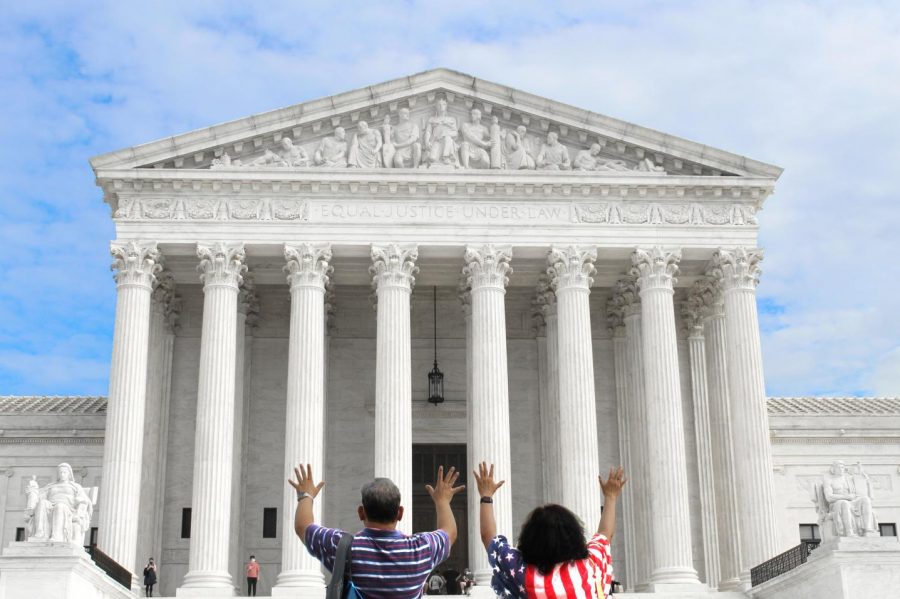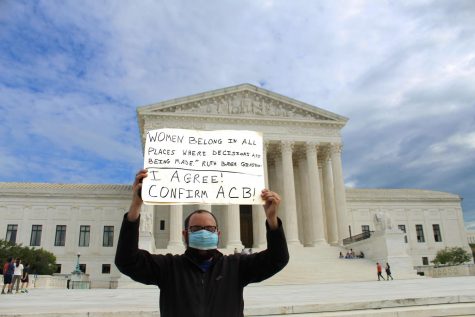Divided among us
Across both sides of the political aisle, discussions are becoming increasingly antagonistic.
A man and wife stand before the Supreme Court, raising their hands in prayer. Over the past few weeks, hundreds of individuals have traveled to the Supreme Court to either protest the appointment of Amy Coney Barrett to the bench or demonstrate support (Photo by seniors Lexie Gagnon, Maddie Koenig, and Cole Sitilides).
America stands a house divided, and as residents of the national capital area, Langley students are inevitably exposed to a greater amount of political activity than most others our age. People hold their breath, afraid that even the most trivial political comment will spiral into an unintentional screaming match. Social media has become our new battlefield, and congressional activity has grinded to halt in a stalemate over the issues of greatest importance in our country. In this new climate, we are defined by our political affiliations and judged accordingly, but the question must be asked: is it a climate we want to live in?
First, let’s look at the way social media has evolved over the past ten years. It has created unhealthy, tribalistic tendencies spawned by confirmation bias and a lack of conversation. While Facebook continues to create divisions between family members and friends, a new form of social media activism is arising on Instagram. Since the new year has picked up, there has been an influx of political posts. The adolescent voice is crucial to the development of society; however, when these posts are not fact checked, the misleading information can cause harm.
While individuals are still developing their own voices, a toxic social climate causes a detrimental divide between two “sides.” Often, the media that individuals are exposed to through social networks depends on who they follow, their age group, geographic location, and the posts they’ve liked in the past. This exposure only creates tunnel vision and stimulates tribalism. The tendency to search only for information that will reaffirm existing beliefs, also known as confirmation bias, is natural human behavior. Finding accurate information from non-partisan news sources is crucial in stimulating conversations. If you stay in the bubble of social media, your thoughts will be trapped too.
Putting yourself in another’s shoes can help break this bubble. Consider what influences help shape a person’s political opinions: access to education growing up, employment status of parents, cultural and religious ties, history of family military service. These factors impact how we view the world and how it should be operated. It is insensitive to make assumptions about a person based on surface knowledge of their political opinions. Disagreement is not only natural, but necessary; it enriches policy discussions that shape our country by presenting varied perspectives. However, when it comes to controversial issues, definitive right-and-wrong narratives ultimately do more harm than good.
Opposing viewpoints is what makes our system of government work. The two-party system that the United States has adopted is a striking example of the progress that can come from ideological diversity. Each party unintentionally helps the other by questioning their actions and both parties benefit from the opposition by witnessing counterarguments to their ideas. However, this system of checks and balances only works if both sides are open to the fact that they might still end in disagreement.
One way we can practice making sophisticated arguments is through the process of argument mapping. An argument map is a visual representation of all claims, evidence, and refutations for an argument. Government teacher Allison Cohen uses this method in her senior classes to help her students to have a holistic understanding of an argument and its counterarguments.
“One of the key things to having a productive, civil conversation is to focus on the argument,” Cohen said. “Focus on the premises, and how the premises lead to the conclusion — an argument map helps you do that.”
When it comes to controversial topics, understanding the opposition is essential. Next time you don’t know how to approach an uncomfortable conversation, go through these simple steps:
- Research: it’s important to fully know about workings of the opposite side before making a claim.
- Keep an open mind: walk into the conversation with a sense of openness and a willingness to listen. People who enter an argument closed-minded will never progress in their understandings of each other.
- Agree to disagree: know that it’s okay to walk out of an argument still in disagreement. As long as there is an intellectual, respectful conversation that takes place, both parties can learn something new.
“Think about it: are you ever going to change your mind because someone is just yelling at you because they think they’re more right than you are?” Cohen said. “That doesn’t progress anything, so we have to find a way for these discussions to be productive.”
In the midst of social separation brought about by the pandemic and the recent election, talking through our differences can help strengthen relationships and better our society. So next time you find yourself engaged in a potential political conflict, take a step back and genuinely try to understand the opposing view. We are all working towards a common goal: bettering our community. Now, more than ever, we must facilitate sincere conversations to create meaningful change in our society.





